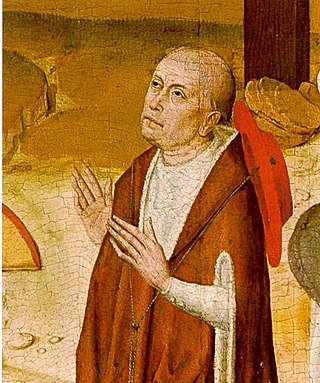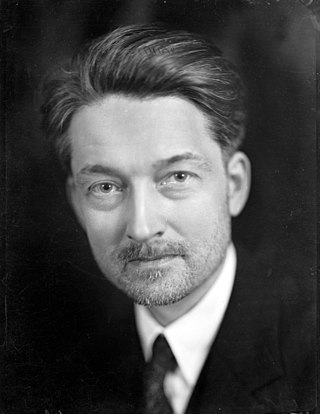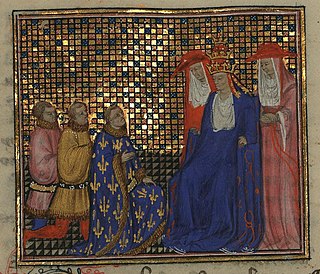The Council of Constance was an ecumenical council of the Catholic Church that was held from 1414 to 1418 in the Bishopric of Constance (Konstanz) in present-day Germany. The council ended the Western Schism by deposing or accepting the resignation of the remaining papal claimants and by electing Pope Martin V. It was the last papal election to take place outside of Italy.

Bessarion was a Byzantine Greek Renaissance humanist, theologian, Catholic cardinal and one of the famed Greek scholars who contributed to the so-called great revival of letters in the 15th century.

Nicholas of Cusa, also referred to as Nicholas of Kues and Nicolaus Cusanus, was a German Catholic cardinal and polymath active as a philosopher, theologian, jurist, mathematician and astronomer. One of the first German proponents of Renaissance humanism, he made spiritual and political contributions in European history. A notable example of this is his mystical or spiritual writings on "learned ignorance," as well as his participation in power struggles between Rome and the German states of the Holy Roman Empire.

Renaissance humanism was a worldview centered on the nature and importance of humanity, that emerged from the study of Classical antiquity. This first began in Italy and then spread across Western Europe in the 14th, 15th, and 16th centuries. During the period, the term humanist referred to teachers and students of the humanities, known as the studia humanitatis, which included the study of Latin and Ancient Greek literatures, grammar, rhetoric, history, poetry, and moral philosophy. It was not until the 19th century that this began to be called humanism instead of the original humanities, and later by the retronym Renaissance humanism to distinguish it from later humanist developments. During the Renaissance period most humanists were Christians, so their concern was to "purify and renew Christianity", not to do away with it. Their vision was to return ad fontes to the simplicity of the Gospels and of the New Testament, bypassing the complexities of medieval Christian theology.

The Western Schism, also known as the Papal Schism, the Great Occidental Schism, or the Schism of 1378, was a split within the Catholic Church lasting from 1378 to 1417 in which bishops residing in Rome and Avignon both claimed to be the true pope, and were joined by a third line of Pisan claimants in 1409. The schism was driven by personalities and political allegiances, with the Avignon papacy being closely associated with the French monarchy.
Conciliarism was a reform movement in the 14th-, 15th- and 16th-century Catholic Church which held that supreme authority in the Church resided with an ecumenical council, apart from, or even against, the pope.

Jacques Maritain was a French Catholic philosopher. Raised Protestant, he was agnostic before converting to Catholicism in 1906. An author of more than 60 books, he helped to revive Thomas Aquinas for modern times, and was influential in the development and drafting of the Universal Declaration of Human Rights. Pope Paul VI presented his "Message to Men of Thought and of Science" at the close of Vatican II to Maritain, his long-time friend and mentor. The same pope had seriously considered making him a lay cardinal, but Maritain rejected it. Maritain's interest and works spanned many aspects of philosophy, including aesthetics, political theory, philosophy of science, metaphysics, the nature of education, liturgy and ecclesiology.

Juan de Torquemada O.P., Spanish ecclesiastic, defender of Jewish conversos, has been described as the most articulate papal apologist of the fifteenth century. He was an uncle of Tomás de Torquemada, afterwards notorious as the persecuting Grand Inquisitor.
The Fifth Council of the Lateran, held between 1512 and 1517, was the eighteenth ecumenical council of the Catholic Church and was the last council before the Protestant Reformation and the Council of Trent. It was convoked by Pope Julius II to restore peace between Catholic rulers and assert the authority of the Pope.

Thomas Cajetan, OP, also known as Gaetanus, commonly Tommaso de Vio or Thomas de Vio, was an Italian philosopher, theologian, the Master of the Order of Preachers 1508 to 1518, and cardinal from 1517 until his death. He was a leading theologian of his day who is now best known as the spokesman for Catholic opposition to the teachings of Martin Luther and the Protestant Reformation while he was the Pope's legate in Augsburg, and among Catholics for his extensive commentary on the Summa Theologica of Thomas Aquinas.

John Major was a Scottish philosopher, theologian, and historian who was much admired in his day and was an acknowledged influence on all the great thinkers of the time. A renowned teacher, his works were much collected and frequently republished across Europe. His "sane conservatism" and his sceptical, logical approach to the study of texts such as Aristotle or the Bible were less prized in the subsequent age of humanism, when a more committed and linguistic/literary approach prevailed.
The Concordat of Bologna (1516) was an agreement between King Francis I of France and Pope Leo X that Francis negotiated in the wake of his victory at Marignano in September 1515. The groundwork was laid in a series of personal meetings of king and pope in Bologna, 11–15 December 1515. The concordat was signed in Rome on 18 August 1516. It marked a stage in the evolution of the Gallican Church.

Peter of Candia, also known as Peter Phillarges, named as Alexander V, was an antipope elected by the Council of Pisa during the Western Schism (1378–1417). He reigned briefly from 26 June 1409, to his death in 1410, in opposition to the Roman pope Gregory XII and the Avignon antipope Benedict XIII. In the 20th century, the Catholic Church reinterpreted the Western Schism by recognising the Roman popes, as legitimate. Gregory XII's reign was extended to 1415, and Alexander V is now regarded as an antipope.

Robert of Geneva was elected to the papacy as Clement VII by the cardinals who opposed Pope Urban VI and was the first antipope residing in Avignon, France. His election led to the Western Schism.

Antonius Walaeus was a Dutch Calvinist minister, theologian, and academic.

Marsilius of Padua was an Italian scholar, trained in medicine, who practiced a variety of professions. He was also an important 14th-century political figure. His political treatise Defensor pacis, an attempt to refute papal claims to a "plenitude of power" in affairs of both church and state, is seen by some scholars as the most revolutionary political treatise written in the later Middle Ages. It is one of the first examples of a trenchant critique of caesaropapism in Western Europe. Marsilius is sometimes seen as a forerunner of the Protestant reformation, because many of his beliefs were later adopted by Calvin and Luther.
Execrabilis is a papal bull issued by Pope Pius II on 18 January 1460 condemning conciliarism. The bull received its name from the opening word of its Latin text, which labelled as "execrable" all efforts to appeal an authoritative ruling of a Pope to a council.
In the Roman Catholic Church, collegiality refers to "the Pope governing the Church in collaboration with the bishops of the local Churches, respecting their proper autonomy." In the early church the popes sometimes exercised moral authority rather than administrative power, and that authority was not exercised extremely often; regional churches elected their own bishops, resolved disputes in local synods, and only felt the need to appeal to the Pope under special circumstances.
James Henderson Burns was a Scottish historian of medieval and modern political thought who also studied utilitarianism and Jeremy Bentham.
The decree Haec sancta synodus, also called Haec sancta, was promulgated by the fifth session of the Council of Constance on April 6, 1415. It contains a section on the question of whether the Pope is above an ecumenical council or, conversely, such a council is above the Pope. The question is related to papal primacy, papal supremacy and conciliarism.











